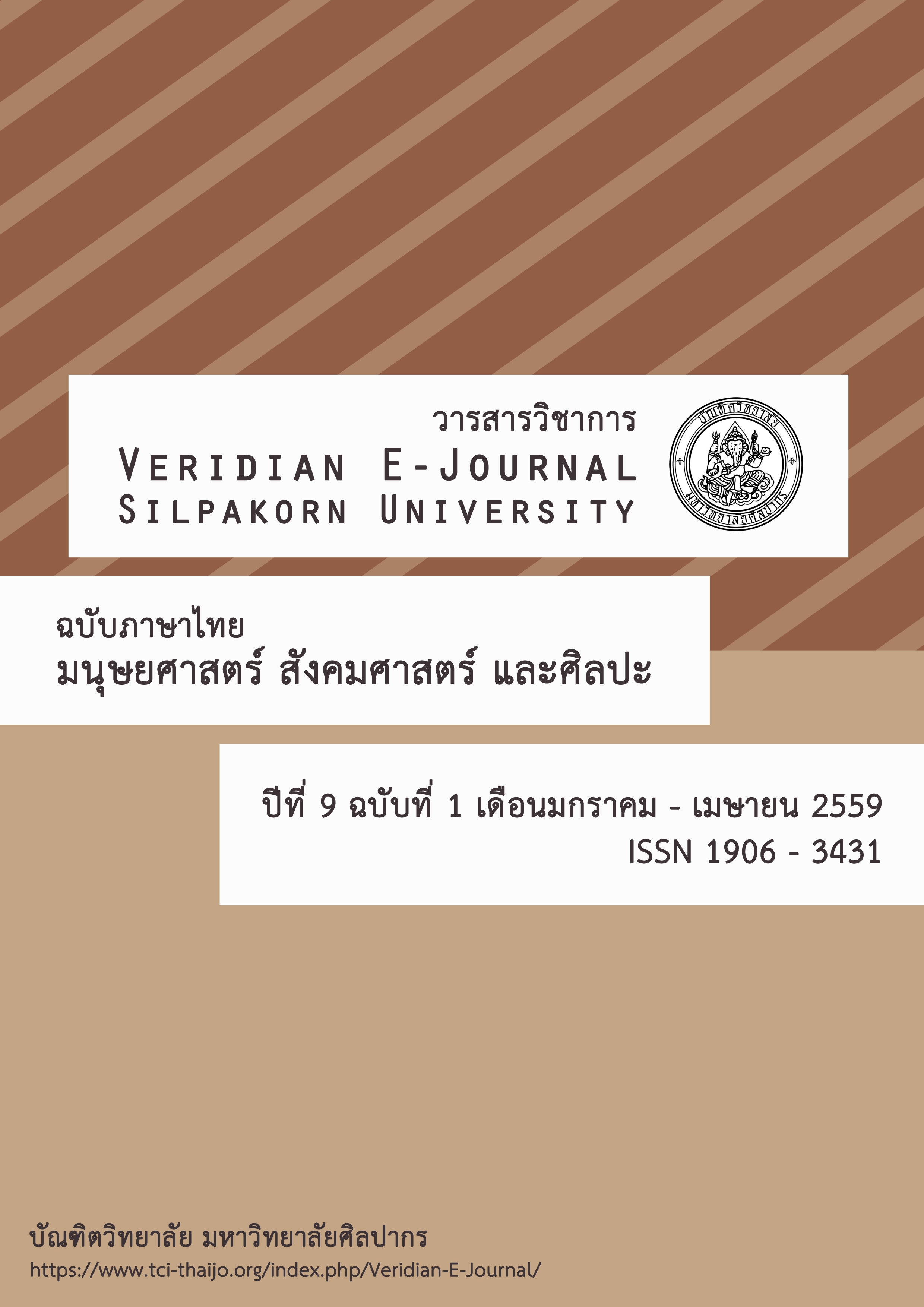รูปแบบการจัดการศึกษานอกระบบโรงเรียนเพื่อเตรียมความพร้อมของนักบัญชีไทยสู่ประชาคมอาเซียน
Main Article Content
Abstract
บทคัดย่อ
งานวิจัยครั้งนี้มีวัตถุประสงค์เพื่อ 1) วิเคราะห์การจัดการศึกษาเพื่อเตรียมความพร้อมของนักบัญชีไทยสู่ประชาคมอาเซียน 2) พัฒนารูปแบบการจัดการศึกษานอกระบบโรงเรียนเพื่อเตรียมความพร้อมของนักบัญชีไทยสู่ประชาคมงานวิจัยนี้เป็นงานวิจัยเชิงคุณภาพที่ใช้การบรรยายสภาพการณ์ที่เกิดขึ้น โดยใช้วิธีการศึกษาเอกสารการศึกษากรณีตัวอย่างการจัดการศึกษาทางด้านบัญชีที่ดีทั้งในประเทศและต่างประเทศและการเก็บข้อมูลที่เกี่ยวข้องกับการจัดการศึกษาแก่นักบัญชีไทยโดยการสัมภาษณ์เชิงลึกกับกลุ่มตัวอย่างที่คัดเลือกแบบเจาะจงจำนวน 20 คนนอกจากนี้ยังมีผู้ทรงคุณวุฒิจำนวน 13 ท่านเข้าร่วมการสนทนากลุ่มเพื่อตรวจสอบรูปแบบ
ผลการวิจัยสรุปได้ว่า
1) การจัดการศึกษาประกอบด้วย 1.1) นโยบายการจัดการศึกษา ที่สนับสนุนการพัฒนาและยกระดับความสามารถของนักบัญชีไทยให้เทียบเท่ามาตรฐานสากล 1.2) สภาพของนักบัญชีไทยในปัจจุบัน ที่ต้องได้รับการพัฒนาความรู้อย่างต่อเนื่อง เพื่อให้มีความรู้เท่าทันต่อมาตรฐานบัญชีที่เป็นสากล 1.3) สภาพคุณลักษณะของนักบัญชีที่มีความพร้อม ตามข้อตกลงร่วมของอาเซียนได้แก่วุฒิการศึกษา ใบอนุญาต ประสบการณ์ การพัฒนาความรูต่อเนื่องทางวิชาชีพ การรับรองด้านจรรยาบรรณ และคุณลักษณะทางวิชาชีพ ซึ่งประกอบด้วยความรู้ทางวิชาชีพ ความรู้เฉพาะทาง ทักษะทางวิชาชีพ ทักษะภาษาอังกฤษ และทักาษการเรียนรู้ และ 1.4) แนวทางการจัดการศึกษา ประกอบด้วยหลักสูตร คุณลักษณะที่พึงประสงค์ เนื้อหา กิจกรรมการเรียนการสอนและการประเมินผล2) รูปแบบการจัดการศึกษานอกระบบโรงเรียน ประกอบด้วย 1)นโยบาย แบ่งเป็น 4 ระดับได้แก่ ระดับประชาคมอาเซียน ระดับประเทศ ระดับสภาวิชาชีพบัญชี และระดับองค์กรและหน่วยงานที่สอดคล้องกันในการยกระดับนักบัญชีไทย 2) กระบวนการของรูปแบบ ประกอบด้วย 6 ขั้นตอน ได้แก่ 2.1) การประเมินความต้องการ โดยระบุอาชีพ ระบุความรู้พื้นฐาน วิเคราะห์การปฏิบัติงาน ตรวจสอบภาระงาน และประเมินความต้องการจำเป็น 2.2) การวางแผนโดยกำหนดผลลัพธ์ที่คาดหวัง จัดลำดับงานและเลือกเนื้อหา และเลือกวิธีการเรียนรู้ 2.3) การพัฒนาหลักสูตรฐานสมรรถนะ โดยกำหนดจุดประสงค์ มาตรฐานการวัดผล 2.4) การเตรียมการ โดยจัดทำแบบทดสอบ คู่มือ และสื่อ และตรวจสอบและปรับปรุง 2.5) การดำเนินการแบบมีพี่เลี้ยง โดยจัดกลุ่ม ระบุปัญหา ทำกระบวนการ นำสู่ปฏิบัติ สรุปผล 2.6) การประเมินผลและรายงานผล และ 3) คุณลักษณะนักบัญชีไทยที่มีความพร้อม ได้แก่ การมีคุณสมบัติตามข้อตกลงร่วมของอาเซียนและมีคุณลักษณะทางวิชาชีพบัญชี ได้แก่ ความรู้ เท่าทัน ทางวิชาชีพ ความรู้ที่เฉพาะเจาะจง ทักษะทางวิชาชีพบัญชี ทักษะการปฏิบัติงาน ทักษะภาษาอังกฤษ และทักษะการเรียนรู้
คำสำคัญ: รูปแบบการจัดการศึกษานอกระบบ; การเตรียมความพร้อมของนักบัญชี
Abstract
The purposes of this research were to: 1) Analyze education management of readiness preparation of Thai Accountants for the ASEAN Community; 2) develop a non-formal education management model. The study was a qualitative research to describe the relevant circumstances by using the content study, case study concerning best practices in education management on accounting, and in-depth interviews with 20 purposive selected samples as key informants. Besides, 13 experts were also participated in the focus group discussions to review the drafted model.
The results of the research were as followings:
1) Education management consisted of : 1.1) policies that supported the development and enhancement of the competence of the accountants to meet the international standards; 1.2)Thai Accountants thatneeded continuity professional development in order to be comparable with the international accounting standards; 1.3) the attributes inherent in the readiness of accountants in accordance with the ASEAN Mutual Recognition Arrangement which consisted of education background, professional licenses, experiences, continuing professional development, and accreditation of ethics, and professional qualifications which consisted of accounting knowledge, specialized knowledge, professional skills, English skills, and learning skills; 1.4) education management which consisted of curriculum, qualifications as required, contents, learning activities, and evaluation.
2) A non-formal education management model consisted of : 1) the 4 policies levels, namely ASEAN Community level, national level, Federation of Accounting Professions level, and workplace and organizations level; 2) the 6 steps of the processes of the model which consisted of 2.1) needs assessments by identifying the occupation, prerequisite knowledge, analyzing current performances, examining future tasks, and assessing essential needs; 2.2) planning by determining expected outcomes, prioritizing tasks, and selecting content and learning methods; 2.3) developing a competency based curriculum by setting objectives and assessment criteria; 2.4) preparation by making tests, teaching manuals and learning materials and medias, and examining and adjusting them; 2.5) implementation with coaching by arranging groups, identifying problems, organizing processes, implementing and making conclusion; 2.6) evaluation and report; 3) the qualifications of readiness of Thai accountants in accounting consisted of the qualifications according to ASEAN Mutual Recognition Arrangement, and qualifications in accounting profession skills which were up to date knowledge, specialized knowledge, accounting profession skills, working skills, English skills, and learning skills.
Keyword: Non-Formal Education Management Model; The readiness preparation of Thai Accountants
